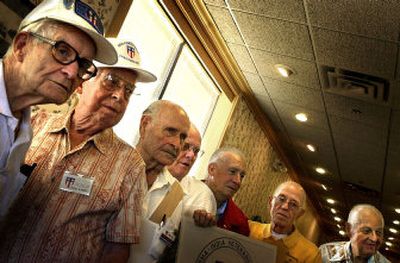Veterans group marks final meeting

They helped build the Burma Road, and they drove its switchbacks. They “flew the hump” to keep China in the war against a million Japanese invaders. A few were called Flying Tigers or Merrill’s Marauders.
On Saturday, these veterans of “the forgotten theater” of World War II, now in their 80s and 90s, called it quits. The China-Burma-India Veterans Association, which once boasted a membership of more than 80,000, is giving up its national charter.
“The old guys are having trouble making it to meetings,” said Hart McCormack Jr., the association’s national commander, from his home in San Antonio, Texas. “It’s a sadness. You understand why it’s happening, but you wish it could go on forever.”
Unlike other veterans’ service organizations, such as the Veterans of Foreign Wars or American Legion, the China-Burma-India group was composed only of veterans of one war – the big one. And they all served in the same theater of operation – the one that wasn’t making headlines at the time.
In 1996, there were 8,164 members of the association in 139 chapters, or bashas (military for bamboo and straw hut assembled), throughout the nation, McCormack said. Today, he estimated, “We’re down to around 3,000.”
And the China-Burma-India vets aren’t getting any younger.
The mean age is 85, said McCormack, who served as a radio operator aboard cargo planes that flew over the Himalayas, or the hump, to supply Chiang Kai-shek’s army.
The last meeting of the Spokane basha, with about two dozen members, was Saturday at the Old Country Buffet at the Franklin Park Mall.
“The group is diminishing because of the passage of time,” said Ken Lobdell, 87, the local commander.
Lobdell landed in Karachi in March 1942 on the Australian troop transport HMTS Duntroon out of Melbourne. He was stationed in Assam Province in Eastern India for 30 months, including five months at an aircraft warning station in a Naga village of headhunters.
Lobdell’s 51st Fighter Control unit with the 10th Air Force was a radar unit without radar, so it established aircraft warning stations in Assam. It was from there, he said, that the famous Ledo Road was started to supply China after the Japanese took the coast and destroyed the Burma Road.
Lobdell was a cook – “not exactly what I intended when I was drafted.” The only action he saw was during a Japanese air raid that caught the Americans with their planes on the ground.
In 1942, when Gen. Henry “Hap” Arnold’s Air Transport Command took over all airlift operations to China, Bob Briley was a 19-year-old radio operator on a C-87 cargo plane, flying the hump from Jorhat, India, to places like Kunming and Cheng-tu in China. It was a dangerous 530-mile trip over the highest peaks in the world.
Like the rest of the Spokane basha, Briley, now 81, is sorry to see the veterans association shut down.
“It was a nice place to go and talk with guys,” he said. “Like anything, sooner or later it comes to an end.”
Ed English spent most of the time he served between May 1943 and October 1945 in Ramgarh, India, at a camp Gen. Joseph Stilwell set up to train Chinese troops after his defeat in Burma.
“Each month we brought in 20,000 Chinese to train,” said English, now 84. “When they were done, they were transported back to Burma.”
The idea, according to McCormack, was to tie up Japanese troops in Burma.
“You can imagine what would happen if 300,000 Japanese were allowed to reinforce the Pacific islands,” the national CBI veterans’ commander said.
As a member of the 124th Cavalry in 1944, Harold Barnhart was a replacement in the Mars Task Force after Brig. Gen. Frank Merrill’s “Marauders” were reduced to 15 percent of their original size in Burma.
Barnhart served there for five or six months, during which time his squad was supplied by airdrop, and a mule was more valuable than a man in the rugged hills and mountains. The task force ended up in China where the Japanese were on the run.
In 1945, he was asked if he could drive a truck and was assigned to drive the reopened Burma Road 1,500 miles to China. He recalls driving a GMC up 23 switchbacks – “you couldn’t make a turn without backing up, and it was 3,000 feet straight down” – and crossing a suspension bridge 200 feet above a chasm in which “the planking would rise up in front of you almost as high as your radiator.”
Now 85, Barnhart is treasurer and former commander of the Spokane chapter. Ordered by the national leadership to dissolve, the local group was to give all $200 of its assets to the Shriners Hospital for Children on Saturday.
Barnhart and other Spokane veterans hope they can continue to get together informally, but they know there will be quite a few who will give up the monthly meetings entirely.
“Some of us will carry on and get together two or three times a year,” Barnhart said. “But there’s going to be a lot of them we will never see again.”